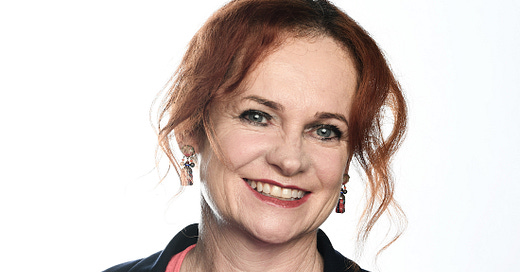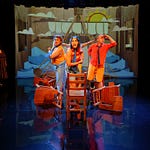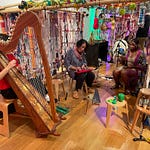
It took ten years of research and writing through some of the toughest times in her life, but journo Helen Pitt’s determination was rewarded.
She not only completed her book on the machinations of building the Sydney Opera House, simply called “The House”, but her work was also recognised as winner of the 2018 Walkley Book Award.

Helen is a long time journalist with the Sydney Morning Herald, and credits the skills she learnt on the floor there, with being able to see such a monumental project through to fruition.
“It is different being an author to being a journalist. It’s creative. It’s more you,” Helen says.
“It’s a lot of freedom, a lot of liberty that you don’t have in journalism.
“You really have to look at it like a proper artistic endeavour, with a beginning, middle and end. Unlike a 400 word news story where you do the inverted pyramid and put the most important information at the top and leave the bottom to be possibly cut by the subs.
“When I started, I went to the State Library in Sydney at the New South Wales State Library. I did a search on the titles with the words Sydney Opera House, the number of books that were already written. There was something like 279, and I was a little overwhelmed by that because I thought, ‘why would mine be any different?’
“The pitch to the publisher was retelling an old story to a new audience, and I thought, ‘Well, how am I going to make this any different?’ So I had to use my point of difference as the fact that I was a journalist. It is completely a paean to the reporters of that era.”
Her investigative skills revealed aspects of the making of the Opera House that had never come to light before, and her incisive writing brings to life this era of Australia history in all its dramatic glory.

“It was a different era of journalism...what I really appreciated was reconnecting with my profession in its past,” she says.
“Even for things like when Jorn Utzon won the international competition to design the Sydney Opera House, the Sydney Morning Herald reporter called him to tell him, they didn’t know that he hadn’t been told yet.
“It was called a radio telephone, it’s kind of like it was ship to shore.
“How do you do that? I didn’t even know the mechanics of how you do that? So I asked a former editor of the Sun Herald, Peter Allen, ‘How do you do that?’ And he could explain it to me in really basic terms. So just even the mechanics of how you were a journalist in that era.”
Helen Pitt tells me on The Journo Project podcast, how she navigates the challenges of long form storytelling, and how her journalistic background with its emphasis on impartiality was crucial in that process.
“Of course you come with your own political persuasions and they’re informed by your past, but I think you owe it to your subject,” she says.
“You need to tell both sides of the story. Even in my book, there are two families involved. There’s two different political parties. There’s lots of sides to a complex story that’s in the past.
“But you’ve got to try and be as even handed as you can on everything that you approach as a journalist. But particularly on a long form piece of journalism, you owe it to your reader to be as fair.”
She says it’s not just the writing, but also gaining the trust of key sources who had never spoken to the media before where a journalist’s skills are so valuable as an author.
What I’m reading
It’s been truly horrific watching the bushfire crisis unfold around the country and seeing the toll it’s taking on people’s lives and animals and their habitats. This article brings a perspective that I think absolutely needs to be embraced and discussed.
Written by Journo Project featured journo extraordinaire and ABC Indigenous Affairs correspondent Isabella Higgins, it discusses the once controversial but now much needed perspective of utilising the thousands of years of Indigenous knowledge to fight bushfires. Their active management of the land aeons before the First Fleet has continued to be passed down from generation to generation. It’s time for that intimate understanding of the Australian landscape to be included in forthcoming land management initiatives.
“A cultural burn helps prevent fire risks, rejuvenate local flora, protect native animal habitat, all while restoring the kinship to the land.”
Indigenous fire practices have been used to quell bushfires for thousands of years, experts say —ABC News
This is a great summary of where to find help for those traumatised by the bushfires, particularly the journos among us on the front line bringing the important news of what’s happening to the nation.
How to get help during bushfire season —Media Entertainment & Arts Alliance
Upcoming
Exciting times for Streets of Your Town—The Journo Project!
Make sure you play your part as part of The Wandering Journo tribe—please share this email with your friends. And also reply to this email with any ideas or suggestions of great Aussie journos who you think should be featured. This email is interactive and I really want to hear your feedback. Your comments might even be featured in the next email!
The prestigious publication The Griffith Review has commissioned me to put together an all encompassing podcast on The Journo Project. I am so thrilled to share this news with you. I will make sure I share that with you through this email as soon as it’s released.
And also we are now moving into the phase of The Journo Project where my paid subscribers will be able to access transcripts of all the interviews. Myself and my amazing website and tech guru and incredible artist in his own right David Harris will be putting these together in coming weeks, and sending you the links in updates.
So I now ask you my Wandering Journo supporters: would you like to see an e-book of all The Journo Project’s featured journos? If so please email me by simply replying to this email and telling me how you’d like to access this, and whether you’d be willing to support its publication.
Or would you prefer to see if put together in a more traditional published format?
Don’t hesitate to let me know. Tell me how you would like to see The Journo Project evolve!
Thanks for making this all possible, my Wandering Journo tribe!
Talk soon!
Nance













Share this post